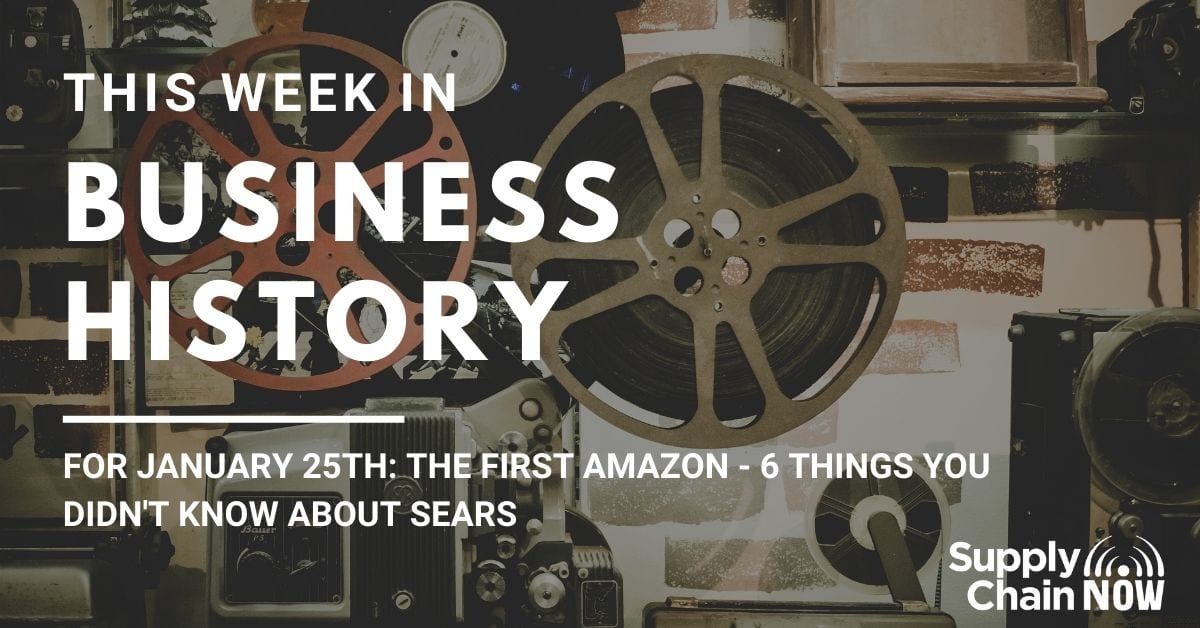Scott Luton (00:12):
Good morning, Scott Luton here with you on this edition of this week in business history. Welcome to today’s show on this program, which is part of the supply chain. Now family of programming. We’ll take a look back at the upcoming week, and then we share some of the most relevant events and milestones from years past, of course, mostly business focused with a little dab of global supply chain. And occasionally we might just throw in a good story outside of our primary realm. So I invite you to join me on this. Look back in history to identify some of the most significant leaders, companies, innovations, and perhaps lessons learned in our collective business journey. Now let’s dive in to this week in business history.
Scott Luton (01:12):
Hello, and thanks for joining us. I’m your host Scott Luton. And today on this edition of this week in business history, we’re focused on the week of January 25th. Thanks so much for listening to the show before we get started today, I have to recognize a massive loss that we’ve recently experienced in our household. When it comes to baseball, we’re passionate Atlanta Braves fans, Ted Turner had begun building his media empire in the 1970s. And one of the smart and savvy moves he made was acquire the broadcast rights to the Braves games starting in 1973. And they begin to air nationally starting in 1977, starting first on his Atlanta based independent television station. WTC G Ted Turner would create Superstation to be TBS a few years later, along with buying the Braves outright, I can recall plenty of TBS moments growing up, watching our beloved Braves.
Scott Luton (02:06):
One of the voices that I listened to during those Braves games was Don Sutton. The prod of Cleo, Alabama Sutton had a hall of fame career as a pitcher with the Dodgers and would go on to endear himself to Braves fans everywhere as a wonderful announcer. Sadly, Don Sutton passed away last week at his home in Rancho Mirage, California. In addition to the loss of Don Sutton, the world lost a giant of a man just a few days ago, as Hank Aaron known across the world of baseball as hammer and Hank passed away last Friday, Hank Aaron famously broke the all-time home run Mark. That was long-held by babe Ruth, but he had to deal with vicious racism over the majority of his 23 seasons in order to get it done. Born in mobile, Alabama, Aaron would grow up in a segregated neighborhood and has shared stories over the years of hiding under his bed from the KKK as a child, when he was just 13 years old, Hank Aaron would hear Jackie Robinson speak in person, and that was all the inspiration he needed to dream about being a professional baseball player.
Scott Luton (03:13):
Thank you. Erin broke a color barrier of his own. As a 1953, he became the first black man to play for a minor league team in the South Atlantic league. Aaron would eventually break through into the bigs with the then Milwaukee Braves in 1954. The Braves franchise moved to Atlanta in time for the 1966 season. And on April 8th, 1974, Hank Aaron would hit home run number seven 15 of his career to become baseball’s all-time home run King, but Aaron had to endure a continuous tidal wave of hate to do it. Hate mail, death threats, kidnapping threats to his own children. And for that matter, even his own team didn’t allow Hank Aaron to stay in the same hotels or ride in the same vehicles as the rest of his teammates is truly staggering. When you stop to think about it, Hank, Aaron would make his Mark in the baseball world becoming a hall of Famer on his first ballot in 1982, but also would go on to make his Mark in Atlanta, Milwaukee, West Palm beach, and many other communities across the country.
Scott Luton (04:16):
There were no shortage of great causes than Hank Aaron would support, participate in and make successful a remarkable man and family with that said our deepest sympathies and prayers go out to the Sutton and Aaron families. Now on a much, much lighter note on today’s show, we’ll be talking about the retail industry. In fact, we’re going to be discussing the company that many call the first Amazon before Jeff Bezos came along, you had Sears Roebuck and company stay tuned as we’re going to discuss six things you didn’t know about Sears. Thanks again for joining us here on this week in business history, PowerBar team here at supply chain. Now, when I hear the word Sears, my mind instantly flashes to Cirrus catalogs and the famous Christmas wish book. That’s where we’ll get started today because on January 25th, 1993, Sears canceled its big book is catalog, which is where it all began.
Scott Luton (05:17):
Richard Sears had founded a mail order watch business in 1886. He met Alva Roebuck a few months later and eventually they established Sears Roebuck and company in Chicago by 1893. So number one on our list of six things you didn’t know about Sears, the company’s first tagline, just like right now, you can get just about anything on amazon.com. But back in the 19th century, the Sears catalog offered at all prompting the company to market themselves as the cheapest supply house on earth. Not all that catchy home with a catalog was some 322 massive pages by 1894 written just about exclusively by Richard Sears himself until his retirement in 1908. And those pages were filled with everything. Clothes, furniture, medical supplies, home goods, bicycles, firearms, you name it. In fact by 1908, Sears was offering what they called house kits. Your pick of over 400 designs of houses and the company would provide whatever was needed to build it.
Scott Luton (06:26):
Some are really all assembly required by 1940 Cirrus had sold over 70,000 homes. Number two on the list, the store’s founder and namesake Richard Sears had not only retired, but also had died before the company opened its first retail store. The prod of Stewartville Minnesota, Richard W. Sears retired in 1908. He reportedly had accumulated a net wealth of about $25 million operating the mail order behemoth, but he had never planned to open a brick and mortar store. That approach allowed the company to keep overhead really low, but the company’s growth depended on Richard Sears, sales and marketing genius. For example, the famed ionization strategy, Richard Sears would ask its best customers in Iowa to distribute about two dozen Sears catalogs. Those great customers would earn commissions off of what was purchased from the catalogs that they had distributed. This idea was Asian strategy work so well that it was expanded to other parts of the country.
Scott Luton (07:34):
Number three, on the list of six things you didn’t know about Sears, Richard W. Sears was one heck of a sales person, but he struggled with the operational side of the business. In fact, it’s been said that Sears ability to drive tons of sales, but fail miserably on execution and fulfillment and management. Well that drove Alva Roebuck crazy and Roebuck would leave the business in 1895, partially due to these frustrations. That was a huge turn of events for the company though, because it opened the door for Julius Rosenwald to buy into the business. Now Rosenwald had serious management chops and recognize the need for a new operational approach for the burgeoning mail order company. He would implement a variety of new processes that streamlined operations reduced errors and added capacity. That’s a great thing because by 1906, Sears was averaging 20,000 orders a day. And just like what we see now with peak volumes that jump off the charts these days during the holidays.
Scott Luton (08:42):
Well, during the Christmas season, Sears volumes could jump up to a hundred thousand orders a day five X with Julius Rosenwald on board. Sears was now poised for even things. Speaking of Mr. Rosenwald, number four on our list of six things you didn’t know about Sears, had it not been for Julius Rosenwald to company made not have made it past the great depression Julius Rosenwald, who was born into a middle-class family in Springfield, Illinois was already very successful before joining the Sears ownership group. He was a millionaire by the age of 33, and it was his personal fortune that came to the aid of the company. As Julius Rosenwald would loan Sears $21 million to help it survive the great depression that ravaged the United States, but Julius Rosenwald would use his accumulated wealth for other non-business pursuits as well. In fact, early on in his life, Rosenwald had decided to donate a third of his wealth to philanthropy.
Scott Luton (09:46):
Perhaps one of the most critical projects that he was involved in was the construction of schools and libraries across the American South Julius Rosenwald would meet Booker T Washington in 1911, and it would open Rosenwald eyes to the immense need of education and resources for African Americans across the South. And he would put his wealth to use right away in the decades that followed Julius Rosenwald would build more than 5,000 schools for African-Americans and also provide for 4,000 libraries for the schools that already existed in doing so, Mr. Rosenwald would help push the civil rights movement forward. Number five on our list, Sears gave birth to an insurance industry, Titan selling tires, and lots of them has been really good to Sears over the years. It all started in 1925. As the story goes, Sears CEO. At the time, Robert, he would let a national survey to name a new brand of tires that the company would offer in their catalog and stores.
Scott Luton (10:54):
Allstate was the winning response from consumers across the country. And thus Sears would launch that popular brand of tires before it was all said and done though, the Allstate name and brand will be used by Sears on a wide range of products, including camper shells, fire extinguishers, and even automobiles. That’s right. Sears offered to Allstate automobiles in the 1950s, the standard and the deluxe additions. Now in 1930 while playing a game of bridge on a train, Carl O’Dell told sear CEO, Robert E. Wood that the company should consider offering auto insurance by direct mail. Odell said that using direct mail, no commissions would need to be paid out as no salespeople would be needed by April, 1931, Allstate insurance company was launched by Sears and the rest is history off by Sears in 1995. So it could focus on its traditional retail business. Allstate has become a fortune 500 company and major player in the insurance industry.
Scott Luton (12:02):
And all of that brings us now to number six on our list of six things that you didn’t know about Sears, the company played a big role in the early days of the worldwide web in 1984, three big companies came together to develop a video techs, service, video techs, Sears, CBS, and IBM joined forces to form TriNetX as binge Edward stated in a July, 2014 article in the Atlantic quote, the plan as conceived from a corporate standpoint was almost naive, really simple. The world’s largest retailer Sears would provide online shopping. The world’s largest media conglomerate. CBS would provide content and information and the world’s largest computer company IBM would provide the underlying technology in quote, but CBS would drop out leaving Sears and IBM to launch the project, which they renamed prodigy. Now prodigy did well for several years, but ultimately was surpassed by AOL and it was eventually killed off.
Scott Luton (13:08):
As the internet really opened up connectivity to all by the late 1990s, prodigy would be officially shut down in early 1999. Now this prodigy initiative is intriguing as it showed Sears early interest in e-commerce possibilities. However, despite being somewhat of a first mover, the company never could really crack the code there in a July, 2020 article by Trisha McKinnon for Indigo digital. There’s a great quote to this end, Robert [inaudible] research director with Gartner’s retail industry services, team States quote, what they missed was the second transition. They stopped producing their catalog the year before Amazon launched, what they failed to see was the next phase. They failed to see that yes, the traditional catalog was maybe not the way forward, but the digital catalog would be theoretically. If they had the vision, they could have figured out how to move the catalog into e-commerce, but they didn’t do that in quote well put.
Scott Luton (14:13):
And that failure to effectively compete despite the headstart in the e-commerce landscape. Well, that would set the stage for a massive bankruptcy and difficult times for one of the nation’s most prolific and legendary retailers. Sears is down to 74 stores, 74 stores as compared to almost 1000 locations in 2018. But some of that empty real estate is being put to good use. In fact, it’s being used in the Corona virus, vaccine distribution rollout. Well that just about wraps up this edition of this week in business history. Big thanks to you, our listener for tuning into the show each week. Hey, be sure to check out a wide variety of industry thought leadership@supplychainnow.com friendly reminder. Of course you can find this week in business history, wherever you get your podcasts from. Hey, be sure to tell us what you think we would love to earn your review on behalf of the entire team here at this week in business history and supply chain. Now this is Scott Luton wishing all of our listeners, nothing but the best. Hey, do good give forward and be the change that’s needed. Be like Hank, Aaron. And on that note, we’ll see you next time here on this week in business history,
Speaker 1 (15:28):
Your buddy.



